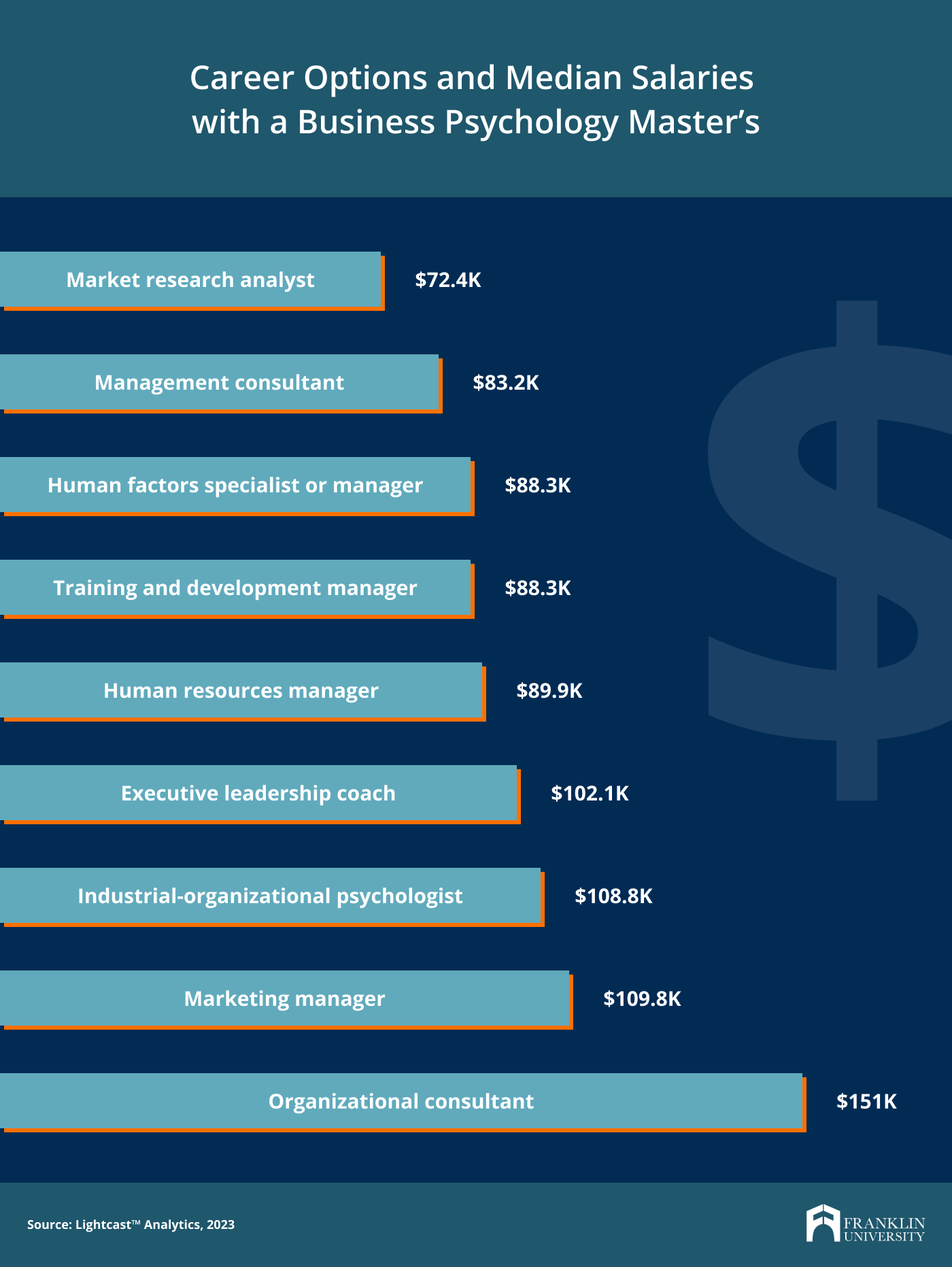Request Information
We're Sorry
There was an unexpected error with the form (your web browser was unable to retrieve some required data from our servers). This kind of error may occur if you have temporarily lost your internet connection. If you're able to verify that your internet connection is stable and the error persists, the Franklin University Help Desk is available to assist you at helpdesk@franklin.edu, 614.947.6682 (local), or 1.866.435.7006 (toll free).
Just a moment while we process your submission.

Business Psychology Salary: What Can You Expect To Earn?
Are you looking for a career where you can make a difference to both individuals and companies, while earning a competitive salary?
Business psychology may be for you.
Demand for professionals in careers related to business psychology is projected to grow 19% by 2032, and a master’s degree in this field can be leveraged to earn higher salaries in many areas.
So what exactly is business psychology, and what salary can you expect in these roles?

What Is Business Psychology?
“Business psychology combines advanced business practices with the study of human behavior to improve productivity, efficiency and culture,” explains Dr. Jeffrey Ferezan, a faculty member in Franklin University’s M.S. in Business Psychology program.
This emerging field offers unique insights into consumer and organizational behavior by applying psychology and neuroscience research to the business context. Practitioners use those insights to motivate behavior, build effective and productive teams and organizations and deliver products and services that resonate with consumers.
While business psychology is similar to the better-known field of industrial-organizational psychology, it applies psychology to a broader range of challenges and situations. By studying business psychology, professionals can develop a framework for understanding everything from building an effective marketing campaign to motivating a high-performing team.
What matters most when choosing a master’s program? Compare features, benefits and cost to find the right school for you.

What Jobs Can I Get with a Business Psychology Degree?
A master’s degree in business psychology prepares graduates to excel in a diverse array of roles and industries. Some graduates work as industrial or organizational psychologists, directly applying their psychology knowledge to improve organizational structure and functioning. Others use their knowledge of human behavior to drive performance in business units like marketing, human resources, or market research.
This master’s is also an excellent choice for management or organizational consultants since it offers a nuanced perspective on the business and human factors that impact team functioning and organizational outcomes.
Business Psychology Salaries
Salaries for business psychology graduates can range widely depending on role and experience level. In addition to opening up specific career opportunities, this degree helps develop the skills you need to excel in management. That means it may help you move into higher-paying leadership positions in your field.
Typical roles and salaries for graduates of business psychology master’s programs include the following:
Market Research Analyst
- Median advertised salary: $72,400
Market research analysts conduct customer and competitor research to help companies create and sell products and services. They use tools including focus groups, surveys and data analysis to draw insights and deliver actionable recommendations to the company.
Management Consultant
- Median advertised salary: $83,200
Management consultants offer businesses an outside perspective to help them grow by cutting costs, improving processes and increasing productivity. Typically, they work for consulting firms and are assigned to specific projects for weeks or months at a time.
Human Factors Specialist or Manager
- Median advertised salary: $88,300
Human factors professionals study how humans interact with their environment and the products they use. They help designers and engineers optimize products, systems and workflows to make them safe, effective and enjoyable.
Training and Development Manager
- Median advertised salary: $88,300
Training and development managers create and deliver professional learning programs and curricula. They may work inside organizations or as external consultants and help organizations reach their goals in areas ranging from technical upskilling to DEI initiatives.
Human Resources Manager
- Median advertised salary: $89,900
Human resources managers help companies attract, retain and develop talent. Core competencies for human resources managers include navigating conflict, coaching individuals and leaders and developing programs to assess and improve performance.
Executive Leadership Coach
- Median advertised salary: $102,100
Executive leadership coaches work with corporate and organizational leaders to help them reach their full potential, combining psychology knowledge with a deep understanding of the business demands of a complex organization. They usually work independently and are contracted by the executives or their companies.
Industrial-Organizational Psychologist
- Median advertised salary: $108,800
Industrial-organizational psychologists use psychology principles to coach employees and leaders, create performance management systems, develop effective team structures and manage organizational culture initiatives.
Marketing Manager
- Median advertised salary: $109,800
Marketing managers create and implement campaigns to sell products and services. To be effective, they need to understand their target customers’ desires and needs and develop messaging that resonates with them.
Organizational Consultant
- Median advertised salary: $151,000
Organizational consultants work independently or as part of a consulting firm to help companies solve structural problems. Sometimes, this means managing transitions like leadership changes, restructures and mergers. In other cases, it involves identifying challenge areas like inefficient processes or outdated operating procedures and offering improvements.
*Median salary data comes from Lightcast Analytics and reflects jobs requiring master’s degrees advertised with salaries between March 2022 and March 2023.
Take Your Next Step with a Master’s Degree from Franklin University
Are you ready to embark on a personally and financially rewarding career helping people and businesses grow? Dive into psychology and neuroscience concepts driving the future of business with an M.S. in Business Psychology from Franklin University.
This online program combines maximum flexibility with personalized support. Franklin’s faculty, themselves experienced practitioners in the field, offer an unmatched level of engagement to ensure you make the most of the program. In as little as 14 months, you’ll learn to use your knowledge of psychology and human behavior to drive business outcomes, all while building confidence in your own leadership and communication skills. No background in psychology is required – just enthusiasm and willingness to learn.
Learn more about how Franklin’s Master’s in Business Psychology can help you advance your career.





